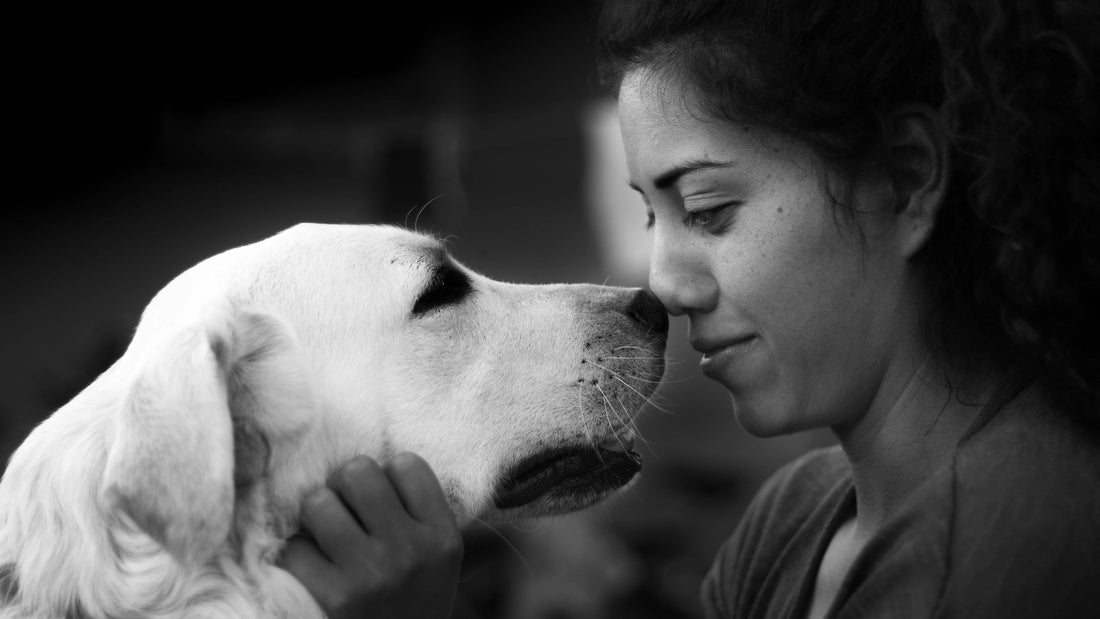Want to boost your mood, reduce your stress and enhance trust? Look no further than your dog’s eyes!
Eyes are often said to be windows to the soul, and nowhere is this truer than in the deep bond shared between humans and dogs. The simple act of locking eyes with our furry companions isn't just a heartwarming moment — it's backed by science.
Studies have revealed that this mutual gaze triggers the release of oxytocin, affectionately known as the "love hormone," in both humans and dogs.
In this blog post, we'll dive into the fascinating connection between mutual gaze and oxytocin release in both species, exploring its profound health benefits.
Have you ever found yourself lost in your dog's eyes, feeling an overwhelming sense of love and connection? It's more than just a fleeting moment of affection — it's a powerful exchange of oxytocin that strengthens the bond between human and canine.
Oxytocin, often referred to as the "love hormone" or "cuddle chemical," plays a vital role in social bonding and attachment.
Whether it's through hugging, kissing, or making eye contact, oxytocin is released during various social interactions, cementing the emotional connection between us and our four-legged friends.
What's truly remarkable is the bidirectional nature of the oxytocin loop between humans and dogs. When we lock eyes with our dogs, not only does oxytocin flood our systems, but it also has the same effect on our furry companions. This reciprocal release of oxytocin forms the foundation of the special relationship we share with our dogs, deepening feelings of love, empathy, and trust on both sides.
But oxytocin isn't just about warm and fuzzy feelings — it boasts a plethora of proven health benefits:
Promotes Bonding and Social Connection:
Oxytocin enhances feelings of trust, empathy, and intimacy, strengthening relationships between individuals. This extends to the bond between humans and dogs, fostering a sense of connection and understanding.
Reduces Stress and Anxiety:
Oxytocin has stress-reducing effects, promoting feelings of relaxation and calmness. Increased oxytocin levels can help alleviate symptoms of anxiety and stress, providing a soothing balm for both humans and their canine companions.
Improves Mood:
Associated with feelings of happiness and well-being, oxytocin can regulate mood and reduce symptoms of depression. It contributes to emotional resilience and fosters a positive outlook on life.
Enhances Trust and Generosity:
Higher oxytocin levels are linked to greater trust and increased generosity in social interactions. By fostering cooperation and compassion, oxytocin promotes pro-social behavior in both humans and dogs.
As if we needed another reason to love dogs even more! So, the next time you're in need of an instant mood booster and stress reducer, lock eyes with your furry friend and bask in the oxytocin-fueled bond that you share.
References:
- Marshall-Pescini S, Schaebs FS, Gaugg A, Meinert A, Deschner T, Range F. The Role of Oxytocin in the Dog-Owner Relationship. Animals (Basel). 2019 Oct 12;9(10):792. doi: 10.3390/ani9100792. PMID: 31614747; PMCID: PMC6826447.
- Carter CS, Kenkel WM, MacLean EL, Wilson SR, Perkeybile AM, Yee JR, Ferris CF, Nazarloo HP, Porges SW, Davis JM, Connelly JJ, Kingsbury MA. Is Oxytocin "Nature's Medicine"? Pharmacol Rev. 2020 Oct;72(4):829-861. doi: 10.1124/pr.120.019398. PMID: 32912963; PMCID: PMC7495339.

